City Council Debates Controversial Background Check Ordinance
October 04, 2024 | Keene, Johnson County, Texas
This article was created by AI summarizing key points discussed. AI makes mistakes, so for full details and context, please refer to the video of the full meeting. Please report any errors so we can fix them. Report an error »

In a recent government meeting, officials discussed proposed changes to the city charter regarding the qualifications for candidacy, particularly focusing on the implications of moral turpitude in relation to criminal convictions. The conversation highlighted the complexities surrounding the definition of moral turpitude and its potential impact on candidates for public office.
One official pointed out that while the current charter disqualifies individuals convicted of felonies from running for office, it does not explicitly address misdemeanors involving moral turpitude. This distinction raises concerns about the subjective nature of determining what constitutes moral turpitude, as it requires a case-by-case analysis of misdemeanors. The official referenced a past incident involving a council member who was removed from office due to a simple assault conviction deemed to involve moral turpitude, illustrating the potential for ambiguity in applying these standards.
The discussion also touched on the necessity of conducting national background checks for elected officials and appointed officials, as well as the implications of such checks for city employees. Some officials expressed concerns about the confidentiality of background check results and the potential for damaging reputations based on non-felony charges. The need for careful handling of sensitive information was emphasized to prevent public shaming or character damage.
Additionally, the meeting addressed the broader context of why many cities do not implement rigorous background checks for elected officials. It was noted that state law provides certain protections for individuals with past convictions, making it challenging to disqualify them from office. The officials acknowledged that while home rule cities have the authority to impose additional requirements, the practicalities of running background checks and the potential for political fallout often deter such measures.
As the city prepares for a charter election in November, the discussions underscored the importance of clarity in the qualifications for candidacy and the need for a balanced approach to ensure both accountability and fairness in the electoral process.
One official pointed out that while the current charter disqualifies individuals convicted of felonies from running for office, it does not explicitly address misdemeanors involving moral turpitude. This distinction raises concerns about the subjective nature of determining what constitutes moral turpitude, as it requires a case-by-case analysis of misdemeanors. The official referenced a past incident involving a council member who was removed from office due to a simple assault conviction deemed to involve moral turpitude, illustrating the potential for ambiguity in applying these standards.
The discussion also touched on the necessity of conducting national background checks for elected officials and appointed officials, as well as the implications of such checks for city employees. Some officials expressed concerns about the confidentiality of background check results and the potential for damaging reputations based on non-felony charges. The need for careful handling of sensitive information was emphasized to prevent public shaming or character damage.
Additionally, the meeting addressed the broader context of why many cities do not implement rigorous background checks for elected officials. It was noted that state law provides certain protections for individuals with past convictions, making it challenging to disqualify them from office. The officials acknowledged that while home rule cities have the authority to impose additional requirements, the practicalities of running background checks and the potential for political fallout often deter such measures.
As the city prepares for a charter election in November, the discussions underscored the importance of clarity in the qualifications for candidacy and the need for a balanced approach to ensure both accountability and fairness in the electoral process.
View full meeting
This article is based on a recent meeting—watch the full video and explore the complete transcript for deeper insights into the discussion.
View full meeting
